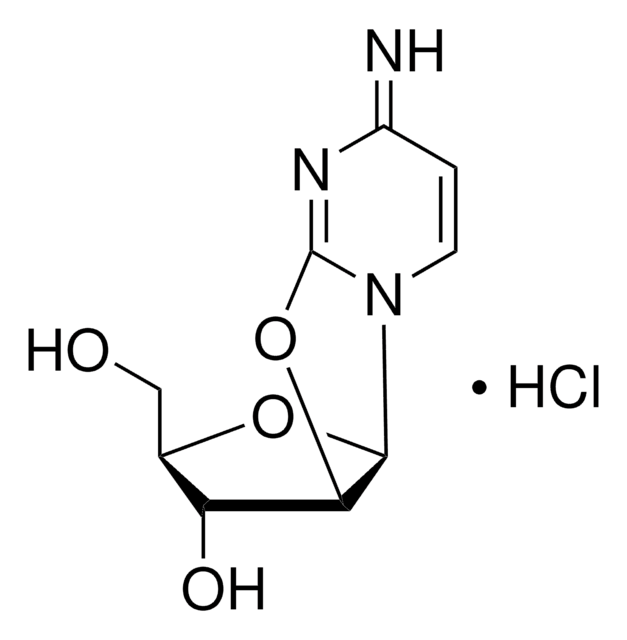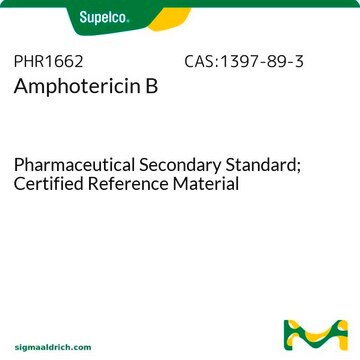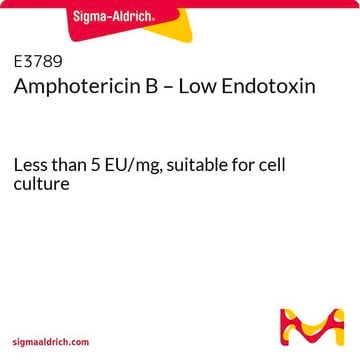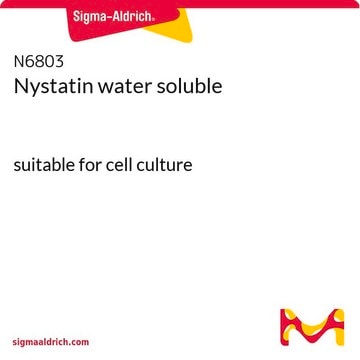A9528
Amphotericin B solubilized
powder, suitable for cell culture, BioXtra
Synonym(s):
Amphotericin B from Streptomyces sp., Fungizone
About This Item
Recommended Products
product name
Amphotericin B solubilized, powder, γ-irradiated, BioXtra, suitable for cell culture
Quality Level
sterility
γ-irradiated
product line
BioXtra
form
powder
technique(s)
cell culture | mammalian: suitable
antibiotic activity spectrum
fungi
yeast
Mode of action
cell membrane | interferes
storage temp.
2-8°C
SMILES string
C[C@H]1O[C@@H](O[C@@H]2C[C@@H]3O[C@](O)(C[C@@H](O)C[C@@H](O)[C@H](O)CC[C@@H](O)C[C@@H](O)CC(=O)O[C@@H](C)[C@H](C)[C@H](O)[C@@H](C)\C=C\C=C\C=C\C=C\C=C\C=C\C=C\2)C[C@H](O)[C@H]3C(O)=O)[C@@H](O)[C@@H](N)[C@@H]1O
InChI
1S/C47H73NO17/c1-27-17-15-13-11-9-7-5-6-8-10-12-14-16-18-34(64-46-44(58)41(48)43(57)30(4)63-46)24-38-40(45(59)60)37(54)26-47(61,65-38)25-33(51)22-36(53)35(52)20-19-31(49)21-32(50)23-39(55)62-29(3)28(2)42(27)56/h5-18,27-38,40-44,46,49-54,56-58,61H,19-26,48H2,1-4H3,(H,59,60)/b6-5+,9-7+,10-8+,13-11+,14-12+,17-15+,18-16+/t27-,28-,29-,30+,31+,32+,33-,34-,35+,36+,37-,38-,40+,41-,42+,43+,44-,46-,47+/m0/s1
InChI key
APKFDSVGJQXUKY-INPOYWNPSA-N
Looking for similar products? Visit Product Comparison Guide
Related Categories
General description
Application
Biochem/physiol Actions
Packaging
Components
Caution
Preparation Note
Aqueous solutions cannot be sterile filtered due to poor solubility. If reconstituted in sterile water, there is no need to filter sterilize.
It is also soluble in DMSO (30-40 mg/mL) and in dimethylformamide (2-4 mg/mL).
Other Notes
Kit Components Only
- Amphotericin B ~ 45 %
- Sodium deoxycholate ~ 35 %
- Sodium phosphate balance
Signal Word
Danger
Hazard Statements
Precautionary Statements
Hazard Classifications
STOT RE 1
Storage Class Code
6.1C - Combustible acute toxic Cat.3 / toxic compounds or compounds which causing chronic effects
WGK
WGK 3
Flash Point(F)
Not applicable
Flash Point(C)
Not applicable
Personal Protective Equipment
Certificates of Analysis (COA)
Search for Certificates of Analysis (COA) by entering the products Lot/Batch Number. Lot and Batch Numbers can be found on a product’s label following the words ‘Lot’ or ‘Batch’.
Already Own This Product?
Find documentation for the products that you have recently purchased in the Document Library.
Customers Also Viewed
Articles
Prevent fungal, yeast, and mold contamination in cell cultures. Discover the best antifungal agent for your cultures with the extensive Sigma® antifungal collection.
Antibiotic kill curve is a dose response experiment in which mammalian cells are subjected to increasing amounts of selection antibiotic
Our team of scientists has experience in all areas of research including Life Science, Material Science, Chemical Synthesis, Chromatography, Analytical and many others.
Contact Technical Service












